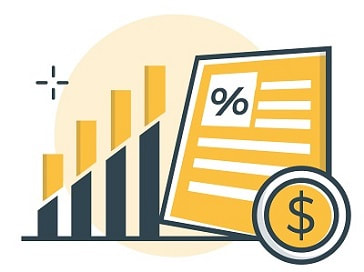Term Deposit Alternatives
Warning: The alternatives we list have much higher risk and your investment is not guaranteed. Furthermore, the list below may not be comprehensive and you may want to seek personalised financial advice and consider other investment options
Updated 18 July 2024
Must-Read Warning and Disclaimer:
Why have we published this guide?
Important: Diversification in asset classes is essential.
Our guide covers:
- Unlike term deposits, the investments we list below are not low-risk. Instead, many are volatile, charge fees and/or have long-term investment objectives. Term deposits are simple, cash-generating investments that offer minimal risk. We have listed the investment options as 'alternatives' to term deposits, but they are, by no means, similar in any way.
- There will also be other alternative investment options beyond what is listed in the guide, and you may wish to seek financial advice.
- The alternative investment options we present below include managed funds which may be risk-assessed under the Financial Markets Conduct Regulations.
- This guide does not constitute financial advice. Any financial asset type included is done so to present options and only as examples of the asset type. Never invest in any financial product you do not understand and/or with money you cannot afford to lose.
- The examples of investments are illustrative only - MoneyHub does not endorse any of the funds, shares or ETFs listed below, nor have we been paid to list any particular investment option.
Why have we published this guide?
- With inflation at hovering around 3.5%, it’s arguable that money is losing value in term deposits (when factoring in tax) - our guides to term deposits and PIE term deposits have the latest rates.
- Our intention is to present a list of options that have the potential to outperform term deposit rates and produce income.
- Want to see the pre-tax returns of a term deposit? Visit our Term Deposit Calculator.
Important: Diversification in asset classes is essential.
- In the 2008 financial crisis, many people had their money in a range of finance companies. For example, if you invested $100,000 in BridgeCorp, Provincial Finance, Hanover Finance, Five Star Finance and Structured Finance, you would have likely lost 80% or 90% of your investment if you held debentures before the companies folded.
- Investment diversification is all about putting your money in many different asset classes that have a proven track record. This can include shares, cash, bonds, term deposits and property, among other asset classes.
- Keep in mind that banks possess varying credit ratings, which serve as indicators of the safety of your term deposit. For more information, refer to our comprehensive Bank Credit Ratings guide.
Our guide covers:
Investment ideas that are alternative to term deposits
Infrastructure Assets: Shares, ETFs and FundsInfrastructure shares and funds invest in electricity generation, airports and roads, among other essential businesses. Profitable infrastructure companies often generate steady, long-term income, which allows them to pay dividends year after year.
Are there risks with investing in infrastructure assets? There is a growing risk that some infrastructure companies trade above the value of their net assets. This means that if you buy a share for $2.50, it may only have $2.00 of net assets and therefore it may fall in price. However, if you’re investing for the long-term, some companies will deliver a high level of dividend income and potential growth (i.e. new customers and/or higher prices) which can counter-balance the risk of overpaying. Examples of infrastructure funds, bond funds, shares and ETFs: iShares Global Infrastructure (IGF) The world’s largest infrastructure ETF lets you own a slice of the largest global providers of transportation, communication, water, and electricity services. An investment in this fund is a bet that global governments will continue to build and improve roads, bridges, sewerage, electricity and water systems. The fund focuses on developed countries, which can mean lower risk (and lower growth).
Pathfinder Water Fund This fund invests in companies globally that are involved in the water industry and are helping solve the world's water crisis. This includes companies making water equipment (pipes, pumps, desalination equipment), water utilities that treat and distribute water and companies that develop new technology around water. No fossil fuels companies are held.
InvestNow offers a number of infrastructure funds on their funds platform, including:
|
Property Assets: Shares, ETFs and FundsShares in property companies remain popular. Many have long-term lease clients, so revenue is almost guaranteed for years to come.
Are there risks with investing in property assets? Yes – commercial property may become vulnerable if rental and/or property prices fall. With working from home now a proven concept, there could be less appetite in the short-term for companies to take on office space. Examples of property funds, bond funds, shares and ETFs: Vanguard REIT ETF (VNQ) The largest real estate ETF in the world allows everyday investors to earn income from Real Estate without having to buy or manage properties themselves. Investors own a slice of around 180 US Real Estate management and development companies, as well as REITs (Real Estate Investment Trusts pool investor money to buy, operate and finance income-generating real-estate).
Pathfinder Global Property Fund This fund invests in listed property companies globally using an ESG (Environmental, Social and Governance) framework as well as financial metrics. Holdings include companies that own office buildings, industrial complexes, retail shops, data centres (with a focus on data centres that develop their own energy from renewable sources), physical storage facilities, forestry, residential and healthcare.
InvestNow offers a number of property funds on their platform, including:
|
International share markets: Shares, ETFs and FundsNew Zealand is a small market; anyone looking for greater opportunities with share investing is probably looking overseas for individual holdings (i.e. buying shares in Tesla or Amazon) and/or in an actively managed investment fund with an international focus.
Are there risks with investing in international shares? Yes - for every Microsoft or Apple success, there are dozens of failures. For this reason, index-focused international funds and actively managed funds are often popular with anyone looking for long-term growth as diversification is Examples of overseas share platforms available in New Zealand:
|
Income Assets and Bonds: Shares, ETFs and FundsIncome funds, which invest in dividend-paying shares, are a popular source of income. However, you can’t base future earnings based on current dividends. The best fund will be one which grows its dividends year and year. Many funds may promote themselves as “income”, but income needs to be grown to be more effective than a high-paying fund that doesn’t grow.
Are there risks with investing in bond and income-based assets? Yes - bonds may become distressed if the company and/or government borrowing the money has difficulty in meeting the repayment or refinancing. However, most bonds picked by trusted fund managers for income-producing funds avoid this issue as they invest in low-risk assets. Examples of income funds, bond funds, shares and ETFs: Pie Conservative Fund The Pie Conservative Fund is managed by Pie Founder and CEO Mike Taylor and seeks to preserve members’ capital, while providing some capital growth, achieving a pre-tax, net of fees return better than bank term deposits over 3-5 years. The Fund is diversified investing primarily in fixed interest securities and some cash, with a modest allocation to equities either directly or through other Pie Funds products. The Fund pays a quarterly distribution for those looking for regular income. The fund also offers flexibility with investors being able to access money from the Fund quickly with redemptions taking 3-5 working days.
Core Aggregate iShares Bond iShares (AGG) Think of AGG as the "S&P 500 of the bond market". With almost 40% invested in US treasury bonds and an annual fee that’s 10x lower than the NZX listed alternative, it’s a straightforward and low cost way for investors to diversify into bonds. Other bond and income fund options include the High Dividend Yield ETF Vanguard (VYM) (available through Hatch and Stake) and the Simplicity Investments NZ Bond Fund. InvestNow offers a number of income funds on their funds platform, including:
|
Peer-to-Peer LendingPeer to Peer lenders, such as Squirrel, offer attractive prospects if you're prepared to invest in secured loans for personal and business borrowers. To learn more, we suggest looking at Squirrel.
Our guide to peer to peer lending explains the pros and cons and everything you need to know. |
Managed FundsNew Zealand has a number of successful active fund managers, with Fisher Funds, Milford Asset Management, Generate and Pie Funds being a handful of examples. However, any managed fund is not without its risk. Our guide to managed funds outlines what you need to know.
Are there risks with investing in managed funds? There is always a risk that your managed funds investment is too weighted towards a certain asset type (i.e. 90% of your money going into shares or property). If there is a market downturn, unlike term deposits, the value of the investment may drop significantly. What managed funds are available in New Zealand? Our guide to managed funds lists the majority of fund managers offering investment opportunities to New Zealand. |
Leading Term Deposit Offers from Trusted BanksIf you’re unsure about what to invest in, term deposits will still generate income. Investing $10,000 for one year at 5% will pay about $350 - $400 after tax to most people.
Are there risks with investing in term deposits? While there are no government gaurantees around term deposits (or bank deposits in general), a term deposit with a New Zealand-registered bank is generally regarded as safe. This is due to strict banking laws that protect investors. However, we believe that NZ-domiciled banks (i.e. Westpac, TSB, Kiwibank, Bank of New Zealand) arguably offer lower risk to investors than international based banks with branches in New Zealand. What term deposits are available? Our guide to the best paying term deposits has the latest offers available. |
Concluding comments:
- The best approach to investing is to always diversify. This means investing in a range of asset classes. Many retirees were burned in the 2008 financial crash when finance companies went under. Despite investing in several different finance companies, the underlying assets were primarily in property loans which became impaired when the housing market collapsed.
- There’s no ‘best’ investment – it comes down to the amount of risk you’re comfortable to take with your money. This guide’s primary purpose is to outline a number of different asset classes and investment examples to help you think about the options.
- The list above may not be comprehensive and you may want to seek personalised financial advice and consider other investment options.










